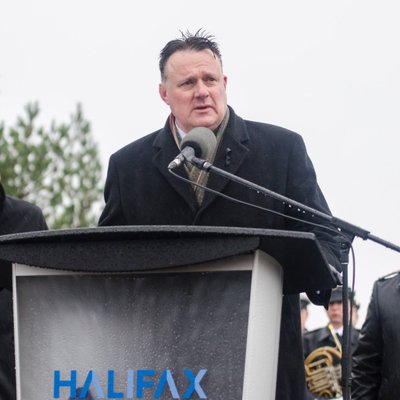Canada News
‘Halifax is not the garrison town of Edward Cornwallis,’ mayor says

FILE: “The Cornwallis statue has become a powerful symbol,” Mayor Mike Savage told council on Tuesday. (Photo: Office of the Mayor/Twitter)
Halifax council has voted to immediately remove a statue of Edward Cornwallis from a downtown park amid growing calls across the country to end the reverence of colonial figures as part of reconciliation with Indigenous Peoples.
After just over an hour of debate, it took less than 10 seconds for council to vote 12-4 to temporarily place the bronze figure of Halifax’s contentious military founder in storage until a decision is made on its long-term fate.
“The Cornwallis statue has become a powerful symbol,” Mayor Mike Savage told council on Tuesday. “I believe its continued presence on a pedestal in the middle of a city park is an impediment to sustained progress and forging productive, respectful and lasting relationships with the Mi’kmaq in the spirit of truth and reconciliation.”
Morley Googoo, regional chief of the Assembly of First Nations, said the decision to take down the statue is a “huge opportunity for the city.”
“Other municipalities across the country are dealing with the same very question about how to have a new relationship with Indigenous Peoples,” he told reporters following council’s decision. “Being here today and witnesses how we talked about it and the progress we’ve made in Halifax, I’m very proud to be here.”
The decision to topple the bronze statue of the city’s founder comes as efforts to scrub colonial names and symbols from public spaces intensify.
Montreal struck the name of British general Jeffery Amherst — a soldier who reportedly wanted to exterminate native inhabitants — from a city street last fall.
A teacher’s group in Ontario voted last summer to rename schools and buildings named after Sir John A. Macdonald, prime minister when the federal government approved the first residential schools in Canada, while a school in Saskatchewan named after a man who recommended residential schools for Indigenous youth is considering a name change.
The United States, meanwhile, is grappling with what to do with Confederate monuments, which to some symbolize white supremacy.
The sweeping debate about how to confront a checkered past has prompted some to worry about the erasure of history, a concern Savage addressed head-on.
“This is not about re-writing history, this is about acknowledging that it is not cast in bronze,” he told council. “We are all a product of our history but we do not have to be a prisoner to it.”
Savage added: “We can all be unshackled from what our history is, which sometimes holds us back from true reconciliation.”
Nova Scotia Mi’kmaq chiefs had called Friday for the statue to be taken down immediately, because a panel appointed in October to study how the city commemorates Cornwallis had not even met yet.
Mi’kmaq activist Rebecca Moore called the decision to remove the statue “surreal.”
“We’ve been resisting this forever, like my whole life,” she said. “One of the great victories of having the statue come down is the reaffirmation that violence against Indigenous Peoples is wrong.”
Cornwallis is a disputed character seen by some as a brave leader who founded Halifax, but by others as the commander of a bloody and barbaric extermination campaign against Mi’kmaq inhabitants.
A staff report to council highlighted rising tensions around the statue, citing a planned protest Sunday that could result in clashes between protesters, damage to the statue and personal injury.
“If we want reconciliation, we pull down the statue immediately,” said Coun. Richard Zurawski. “Let’s end the 500 years of broken promises and take away this visual symbol of supremacy.”
But some councillors criticized acquiescing to demands under the threat of violence, noting that it set a dangerous precedent for city council’s decision making.
One councillor, Steve Adams, called for leaving the statue but also adding statues of Acadians, Mi’kmaqs and others in a “Founders’ Plaza” with interpretive panels.
“This is not the way to run a city, based on threats of violence,” he said.
Savage said the decision is “not about the threat of violence” or “being blackmailed.”
“I feel very strongly it’s the right thing to do,” he said, noting that he doesn’t want to bury the “lessons of history” or “hide the truth” and would consider the idea of a heritage park.
Halifax councillors voted last fall to launch a special advisory committee that would provide council with advice on what to do with Cornwallis commemorations, as well as make recommendations for honouring Indigenous history.
But the Assembly of Nova Scotia Mi’kmaq Chiefs has said it was frustrated with a process that has dragged on for “far too long.”
The assembly said it submitted names of potential Mi’kmaq panellists, but the committee had yet to be formed.
In a statement, the Halifax Military Heritage Preservation Society urged all parties to “re-engage in meaningful dialogue.”
“It’s unfortunate that council felt it necessary to remove and place the statue in temporary storage due to the concern for public safety,” the statement said. “This action has sidelined the special advisory committee process.”





















